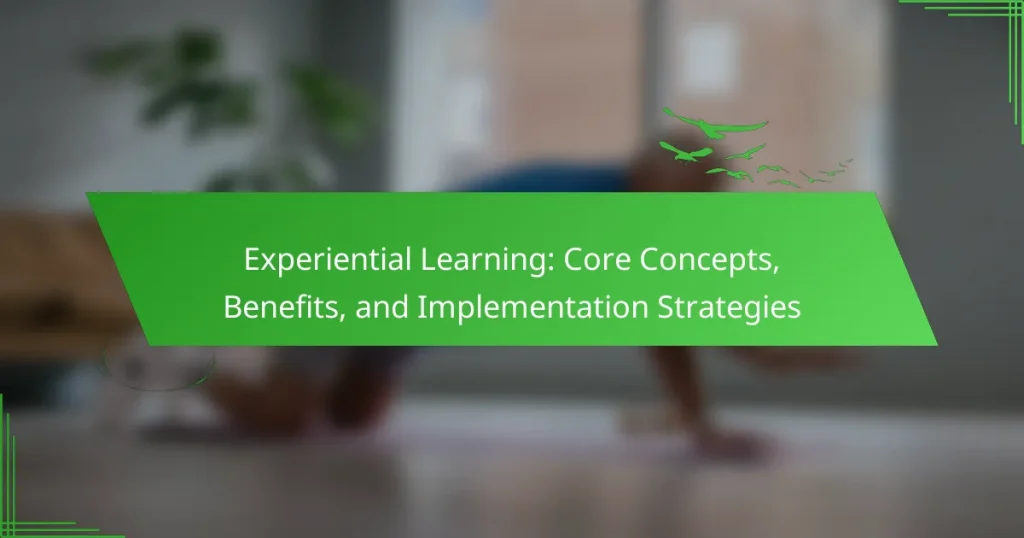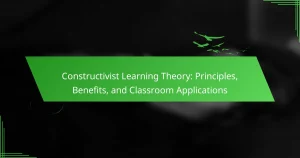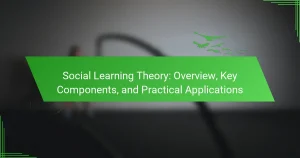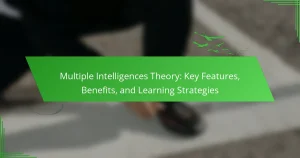Experiential learning enhances retention, critical thinking, and engagement through active participation. This article explores core concepts like hands-on activities and reflection, highlights benefits such as improved problem-solving skills, and outlines effective implementation strategies including projects and simulations. Additionally, it examines unique attributes that deepen the learning experience, fostering adaptability and collaboration in educational settings.
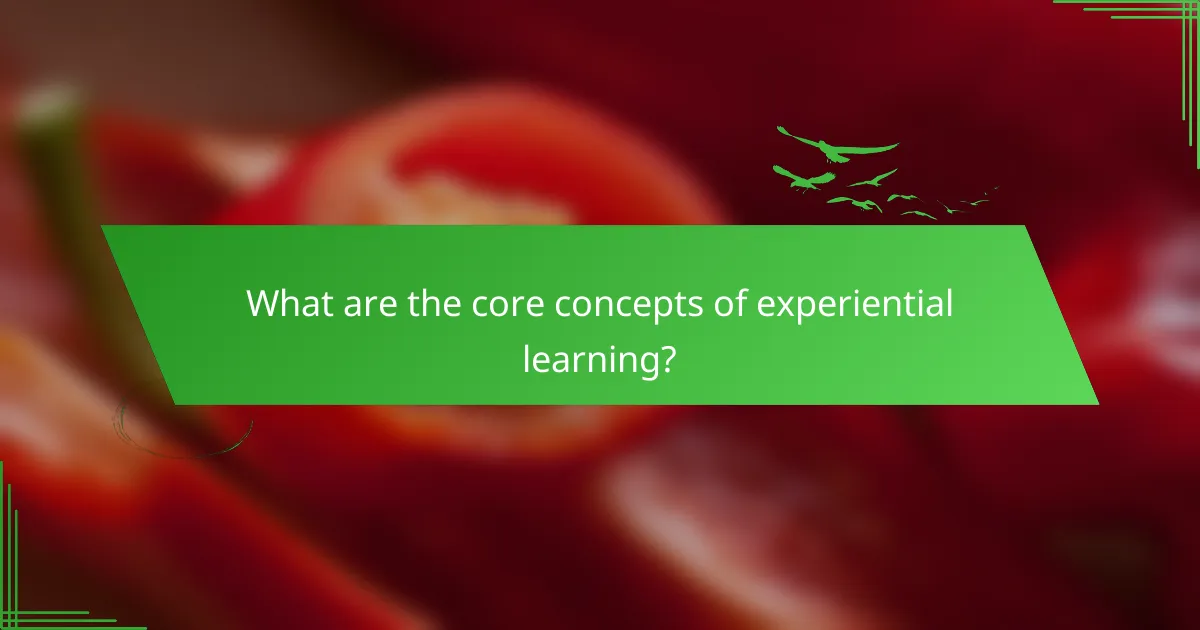
What are the core concepts of experiential learning?
Experiential learning emphasizes learning through experience and reflection. Core concepts include active engagement, reflection, and application of knowledge. These elements foster deeper understanding and retention. Active engagement involves hands-on activities, while reflection allows learners to analyze experiences. Application connects theory to practice, enhancing real-world relevance.
How does experiential learning differ from traditional learning methods?
Experiential learning emphasizes hands-on experience, while traditional learning relies on passive knowledge acquisition. Experiential learning fosters critical thinking and problem-solving through real-world application. In contrast, traditional methods often focus on memorization and theoretical understanding. This unique approach enhances retention and engagement, making learning more impactful.
What are the key principles of experiential learning?
Experiential learning is based on active participation and reflection. Key principles include concrete experience, reflective observation, abstract conceptualization, and active experimentation. These stages promote deeper understanding and practical application of knowledge. Engaging in real-world experiences enhances retention and encourages critical thinking.
What role does reflection play in experiential learning?
Reflection is crucial in experiential learning as it allows individuals to process and analyze their experiences, leading to deeper understanding and personal growth. By engaging in reflective practices, learners can identify lessons learned, apply insights to future situations, and enhance critical thinking skills. This process transforms experiences into meaningful knowledge, fostering continuous improvement and adaptation in various contexts.
How is active participation essential in experiential learning?
Active participation is crucial in experiential learning as it fosters deeper engagement and retention of knowledge. When learners actively engage, they connect theory to practice, enhancing understanding. This approach also encourages critical thinking and problem-solving skills, making learning more relevant and applicable. Active participation allows learners to reflect on their experiences, leading to personal growth and development. Engaged learners are more likely to collaborate effectively, share insights, and contribute to a dynamic learning environment.

What benefits does experiential learning offer?
Experiential learning offers numerous benefits, including enhanced retention, improved critical thinking, and increased engagement. By actively participating in the learning process, individuals can better connect theory to practice. This approach fosters collaboration and develops problem-solving skills, essential for real-world applications. Additionally, experiential learning cultivates adaptability, preparing learners for dynamic environments.
How can experiential learning enhance critical thinking skills?
Experiential learning enhances critical thinking skills by providing hands-on experiences that encourage reflection and analysis. This method fosters deeper understanding and the ability to apply knowledge in real-world contexts. Engaging in practical activities promotes problem-solving and decision-making, essential components of critical thinking. As a result, learners develop the capacity to evaluate situations, consider multiple perspectives, and draw informed conclusions.
What impact does experiential learning have on retention and application of knowledge?
Experiential learning significantly enhances retention and application of knowledge by engaging learners in hands-on experiences. This approach allows individuals to connect theoretical concepts with real-world situations, leading to deeper understanding. Studies show that learners retain information better when they actively participate in the learning process, as it promotes critical thinking and problem-solving skills. Additionally, experiential learning fosters a sense of ownership over the knowledge gained, encouraging learners to apply it in various contexts.
In what ways does experiential learning foster collaboration and teamwork?
Experiential learning fosters collaboration and teamwork by engaging participants in hands-on activities that require communication and cooperation. This approach promotes shared problem-solving, enhances interpersonal skills, and builds trust among team members. As a result, learners develop a deeper understanding of group dynamics and the importance of diverse perspectives in achieving common goals.
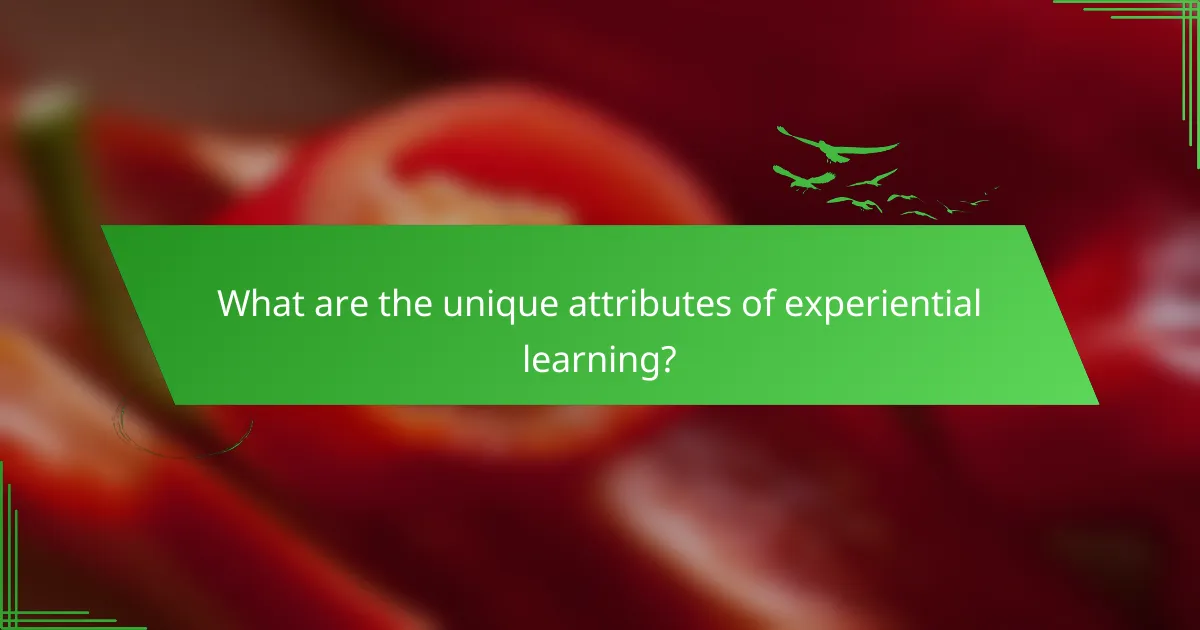
What are the unique attributes of experiential learning?
Experiential learning uniquely emphasizes active engagement, reflection, and real-world application. Key attributes include hands-on experiences, collaborative learning environments, and adaptability to individual learning styles. These elements foster deeper understanding and retention of knowledge. Additionally, experiential learning enhances critical thinking and problem-solving skills, making it a valuable approach in educational settings.
How does experiential learning promote real-world problem-solving?
Experiential learning enhances real-world problem-solving by providing hands-on experiences that foster critical thinking. This learning approach encourages learners to engage directly with challenges, apply theoretical knowledge, and adapt strategies in dynamic environments. As a result, learners develop practical skills and confidence, enabling them to tackle complex issues effectively.
What role does feedback play in the experiential learning process?
Feedback is essential in the experiential learning process as it enhances understanding and promotes growth. It provides learners with insights into their performance, enabling them to reflect on experiences and adjust their approaches. Effective feedback fosters a cycle of continuous improvement, making learning more impactful. Additionally, timely and specific feedback can motivate learners, encouraging them to engage more deeply with the content. Engaging in this feedback loop solidifies knowledge retention and application in real-world scenarios.

What rare attributes can be found in experiential learning?
Experiential learning can include rare attributes such as immersive environments, interdisciplinary integration, real-time feedback loops, emotional engagement, transformative experiences, and cultural sensitivity. These attributes enhance the depth and effectiveness of the learning process.
How does cultural context influence experiential learning outcomes?
Cultural context significantly shapes experiential learning outcomes by influencing perceptions, motivations, and engagement levels. Diverse cultural backgrounds provide unique perspectives that can enhance critical thinking and problem-solving skills. For instance, collectivist cultures may emphasize group collaboration, while individualistic cultures prioritize personal achievement. Understanding these dynamics allows educators to tailor experiences that resonate with learners, fostering deeper connections and improved retention. Additionally, cultural nuances can affect how feedback is received and acted upon, impacting overall learning effectiveness.
What innovative formats exist for experiential learning?
Innovative formats for experiential learning include simulations, role-playing, project-based learning, and immersive environments. These formats enhance engagement and practical application of knowledge. Simulations allow learners to practice real-world scenarios in a controlled setting. Role-playing fosters empathy and understanding by placing learners in different perspectives. Project-based learning encourages collaboration and problem-solving through hands-on projects. Immersive environments, such as virtual reality, provide experiential learning opportunities that are interactive and engaging. Each format offers unique benefits that cater to various learning styles and objectives.
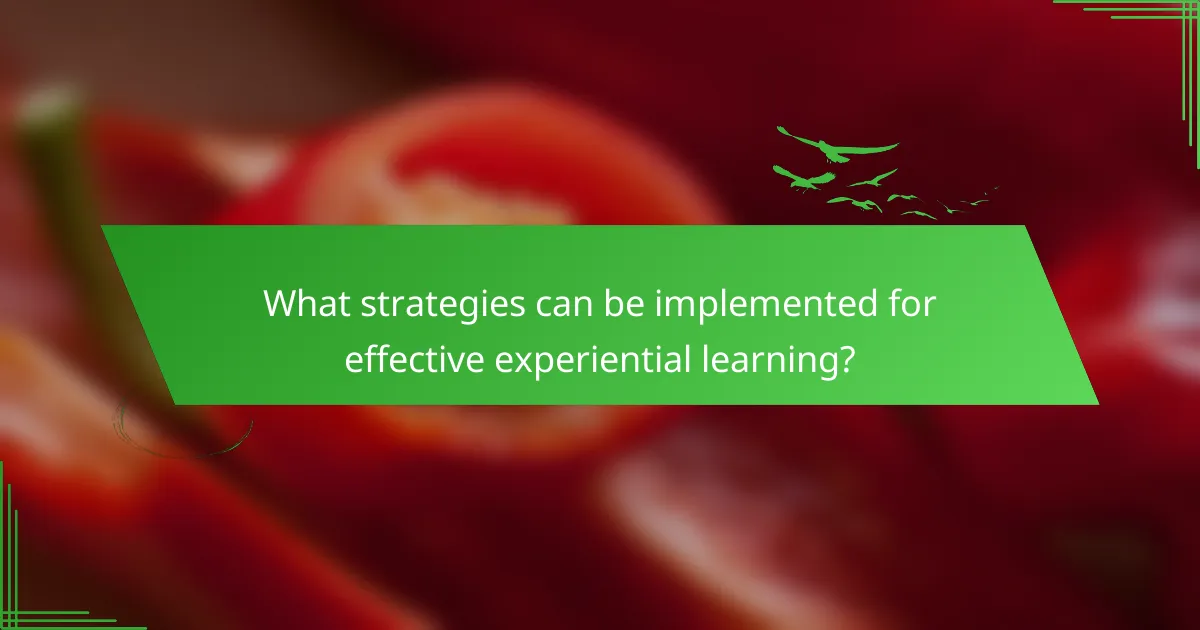
What strategies can be implemented for effective experiential learning?
Experiential learning can be effectively implemented through strategies such as hands-on projects, simulations, and reflective practices. These approaches encourage active engagement and real-world application of knowledge.
1. Hands-on Projects: Involve learners in practical tasks that relate directly to their field of study. This fosters skill development and problem-solving abilities.
2. Simulations: Create realistic scenarios where learners can practice skills in a controlled environment. This enhances decision-making and critical thinking.
3. Reflective Practices: Encourage learners to analyze their experiences and outcomes. This promotes deeper understanding and personal growth.
4. Collaborative Learning: Facilitate group activities that require teamwork and communication. This builds interpersonal skills and enhances learning through diverse perspectives.
How can educators design impactful experiential learning experiences?
Educators can design impactful experiential learning experiences by integrating real-world contexts, encouraging active participation, and fostering reflection. These strategies enhance engagement and deepen understanding.
Incorporating authentic tasks allows learners to connect theory with practice. For example, project-based learning promotes collaboration and critical thinking.
Utilizing diverse assessment methods, such as peer evaluations and self-reflections, helps gauge learning outcomes. This approach also supports individual growth and accountability.
Finally, establishing a supportive environment encourages risk-taking and creativity, which are vital for effective experiential learning.
What assessment methods are effective for measuring experiential learning?
Experiential learning can be effectively measured using assessment methods such as reflective journals, peer evaluations, and project-based assessments. These methods capture individual experiences and insights, enhancing understanding of learning outcomes. Reflective journals encourage self-assessment and critical thinking, while peer evaluations provide diverse perspectives on group dynamics. Project-based assessments demonstrate practical application of knowledge, showcasing skills in real-world contexts. Each method aligns with the core principles of experiential learning, emphasizing active engagement and personal reflection.
What tools can facilitate reflection in experiential learning?
Tools that facilitate reflection in experiential learning include journals, discussion groups, feedback sessions, and digital platforms. These tools enhance critical thinking and self-awareness by encouraging learners to analyze their experiences. Journals allow for personal insights, while discussion groups foster collaborative reflection. Feedback sessions provide external perspectives, and digital platforms offer interactive ways to document and share reflections. Each tool serves to deepen the learning process and promote continuous improvement.
What common mistakes should be avoided in experiential learning implementation?
To ensure effective experiential learning implementation, avoid these common mistakes. Failing to align learning experiences with objectives can lead to confusion. Neglecting participant feedback results in missed opportunities for improvement. Overloading sessions with information can overwhelm learners, reducing retention. Finally, ignoring the importance of reflection limits the depth of learning.
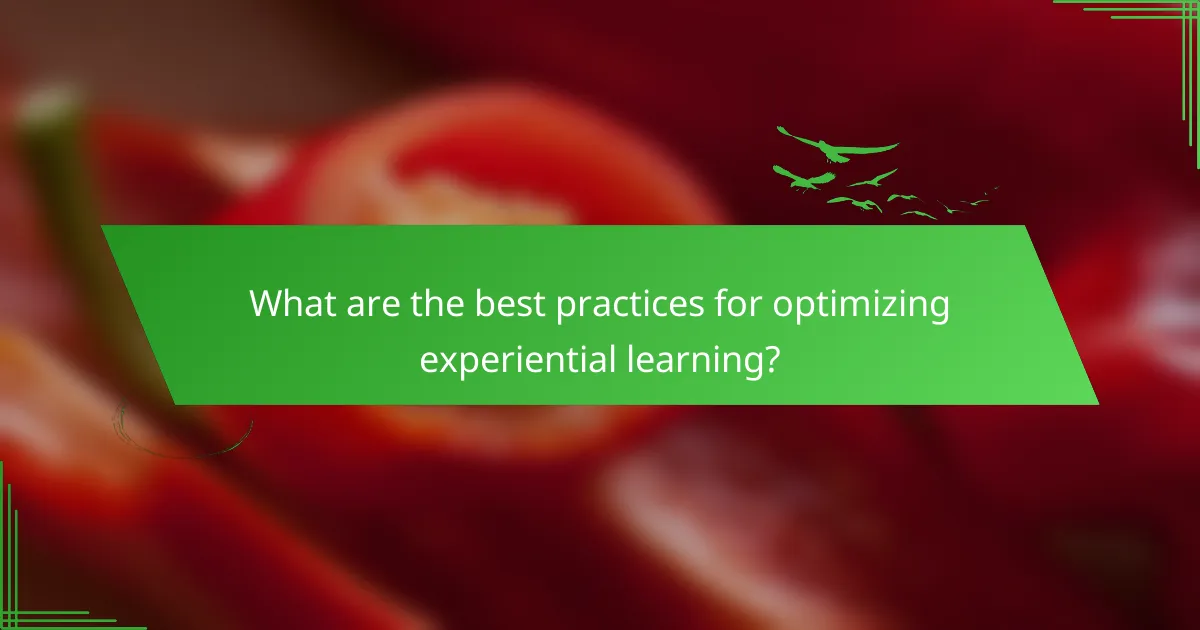
What are the best practices for optimizing experiential learning?
To optimize experiential learning, focus on active engagement, reflection, and real-world application. Incorporate hands-on activities that relate to learners’ interests. Ensure assessments align with experiential goals, fostering deeper understanding. Encourage collaboration and peer feedback to enhance learning outcomes.
How can technology enhance experiential learning experiences?
Technology enhances experiential learning by providing immersive, interactive, and personalized experiences. Tools like virtual reality and simulations allow learners to engage in real-world scenarios safely. These technologies foster collaboration and communication among students, enhancing critical thinking and problem-solving skills. As a result, learners can apply knowledge in practical contexts, leading to deeper understanding and retention.
What resources are available for educators to improve experiential learning?
Educators can access various resources to enhance experiential learning, including professional development workshops, online courses, and community partnerships. These resources provide practical strategies and tools for implementing experiential learning effectively.
Professional development workshops often focus on hands-on techniques and collaborative learning approaches. Online courses offer flexibility and a wide range of topics, from project-based learning to real-world applications. Community partnerships can provide students with authentic experiences, such as internships and service-learning opportunities.
Additionally, educational organizations and networks often share best practices and case studies that illustrate successful implementation of experiential learning. These resources collectively support educators in creating engaging and impactful learning environments.
How can collaboration with industry enhance experiential learning opportunities?
Collaboration with industry significantly enhances experiential learning by providing real-world contexts and resources. This partnership allows students to apply theoretical knowledge in practical settings, fostering critical thinking and problem-solving skills. Industry collaboration can include internships, mentorships, and project-based learning, which enrich the educational experience. Engaging with professionals exposes students to current trends and practices, preparing them for future employment. Additionally, industry partners can offer insights into skills needed in the job market, ensuring curricula remain relevant and effective.
